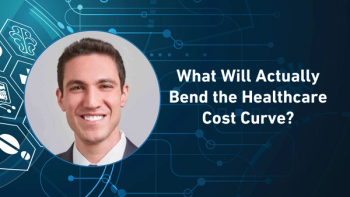
- Pharmaceutical Commerce - June 2020
- Volume 15
- Issue 2
A conversation with Chip Davis, HDA
Chester “Chip” Davis was appointed to the role of president and CEO of the Healthcare Distribution Alliance in March 2020—and, as noted below, was immediately thrown into the fire of the Covid-19 pandemic. Previously, he was president and CEO of another prominent pharmaceutical organization, the Assn. for Accessible Medicines (AAM, formerly the Generic Pharmaceutical Assn.) The springboard to these national roles was his time as a corporate affairs executive at AstraZeneca, which also led to a role at the Pharmaceutical Research and Manufacturers of America (PhRMA). His educational background is the University of Delaware, and a JD from the University of Baltimore School of Law.
Pharmaceutical Commerce connected with Mr. Davis in early May; here’s what he had to say.
1.Taking over the reins of the trade association of US pharma distributors, in the middle of the worst global pandemic of the past century, has certainly been a trial by fire. What can you tell us about the actions of your member companies during this period? What has surprised you, and what do you wish were functioning better in pharma distribution?
I have been in the office since the first week of March, and it has been quite an experience to say the least.
In the immediate term, the pandemic has demonstrated the unique expertise of HDA member companies. As it relates to disaster planning, distributors bring significant experience to bear, with business continuity plans to ensure medicines and supplies are delivered safely, efficiently and reliably. While our members compete with one another, where appropriate, they have worked together to meet demand—within relevant legal boundaries. It’s been ‘all hands on deck.’
Thinking about the overall situation, I see four areas where our members have risen to the occasion: First, they have continued to ensure that the pharmaceutical supply chain ultimately enables patients to be treated. This involves managing strong relationships with 1,300+ drug manufacturers to deliver healthcare products to more than 180,000 healthcare providers and pharmacies daily.
Second, our members have been committed to their employees. From the smallest to the largest companies, they have been going above and beyond to take care of their employees and ensure a safe workplace. Third, it is important to note all this has been done while maintaining regulatory compliance, even while regulations have been shifting around from one state to another as authorities responded to the crisis.
Fourth—and this is not necessarily unique to the Covid-19 pandemic—is the recognition of our members as logistics experts. They have been in constant dialogue with local, state and federal public health agencies, working to move products to ‘hot spots’ during a very dynamic situation.
Behind the scenes, we have been working with the Federal Emergency Management Agency (FEMA), which put together a working group, the Supply Chain Task Force, that meets daily. Similarly, HDA and our membership also have been in close coordination with the Food and Drug Administration (FDA), Drug Enforcement Administration, other federal agencies as well as state governments to address regulatory barriers that slow down the supply chain and ultimately limit patient access to medicines.
2. Stepping back now from the current situation, what are your aspirations for where to take HDA in the coming years?
From the moment I joined the pharmaceutical sector, in the mid-1990s, I have been fascinated by the inner workings of this industry. It has met challenges such as developing treatments for HIV, or hepatitis C, as well as making access affordable through generic products and biosimilars. What I did not have as much visibility into were the critical connection points between the manufacturers and the hundreds of thousands of dispensers and providers. Our members are the ‘vital link’ of the pharmaceutical supply chain.
In the wake of this pandemic, more attention will be paid to supply chain issues. In my discussions with HDA member executives, what was clear to me is that the voice of our companies needs to be better heard on policy issues. Distributors are the ‘unsung heroes’ of the pharmaceutical supply chain, and in general, the value of our services in healthcare needs to be better understood. That will be a key goal of mine in this role.
3. Tell us about the membership of HDA. Who are they, and what are their common interests, as represented by the structure of the association?
HDA represents primary pharmaceutical distributors. By this, I mean companies that predominantly buy medicines and healthcare products directly from manufacturers, inventory and warehouse those products, and deliver them to pharmacies, hospitals and other sites of care nationwide. Our members distribute some 92% of all drugs in the nation.
Counted among our 35 members are large Fortune 500 companies; regional, family-owned and small businesses supporting their communities; and specialty distributors delivering intricate treatments, all united in their goal to ensure the safest and most efficient supply chain for our ultimate customer, the patient. The scope of HDA members’ core and value-added services (studied last year through our ‘Role of Distributors in the US Health Care Industry’ report) cannot be understated. Our members are critical trading partners that provide value to the overall healthcare ecosystem.
It is worth noting that HDA membership also reflects the breadth of the supply chain, including branded, generic and over-the-counter manufacturers; third-party service providers; and international companies. Given our shared interest in supply chain security, in 2018, HDA also expanded its expertise by incorporating the Pharmaceutical Cargo Security Coalition into our membership.
4. Before the Covid-19 epidemic, there was the opioid-abuse epidemic, which has by no means disappeared. Are HDA activities to address this epidemic ongoing?
First, it is important to recognize some context of distributors’ role as it relates to controlled substances. Distributors are one part of a complex supply chain—they do not manufacture, prescribe, dispense or drive demand for medicines, but are focused on moving medications, prescribed and ordered by regulated providers and pharmacies, to where they are needed as swiftly and efficiently as possible. Recognition that there was a crisis in the making came slowly, and all parts of the healthcare ecosystem—providers, pharmacies and distributors, as well as manufacturers, are committed to bringing an end to the epidemic.
Now, with the benefit of hindsight, we can see that more education and better treatment options need to be developed. In that context, HDA is a founding member of Allied Against Opioid Abuse (AAOA), which recently celebrated its second anniversary. AAOA now has 20 partner organizations—ranging from the American Pharmacists Assn. to the National Consumers League and many others. By combining our voices and networks, we have been able to reach more than 1 million people across the country to educate them about the proactive steps they can take to prevent prescription opioid abuse and misuse. Over 40 educational and information resources have been produced, helping healthcare providers and consumers to understand prescription safety and abuse prevention.
Some states are looking to pass legislation to fund opioid treatment or abuse prevention, both of which are obviously critically important. But the funding mechanisms, some of which are based on taxing opioid distribution and increasing licensure fees within certain states, need to be looked at closely as they may jeopardize patient access to, and increase costs of, pain medications.
5. Historically, HDA has preferred uniform national standards for regulations, such as licensure or operational requirements. But there has been a trend—increasingly as a result of the pandemic, it seems—for states to go their own way. How much of a problem is this for HDA? Are there any more-challenging situations across the national landscape?
Historically, the supply chain for national drug distribution has been highly regulated at the federal level. The debate over the Drug Supply Chain Security Act is an obvious example; HDA was highly concerned that the prospect of 50 states adopting their own standards would have had a major negative impact on the national supply chain.
Now, rising drug costs have put the entire supply chain on the radar again. States feel the need to be more actively engaged on policy issues. We are prepared to participate in that discussion. HDA members are being negatively portrayed as mysterious “middlemen” affecting drug pricing, but the reality is that our percentage of ultimate drug costs is small—distributors actually save the healthcare ecosystem billions on an annual basis.
Another important issue in the national debate is drug importation, for which HDA is on record as having a harmful effect on the security and integrity of the pharmaceutical supply chain, and for which the economic benefits are very much in doubt.
6. Implementation of the Drug Supply Chain Security Act (DSCSA) is pretty active today among HDA members. How well will your members be prepared for the full enactment scheduled for 2023?
DSCSA is a fairly complex technical and policy issue, so HDA needs to remain, as it has been to date, centrally involved as a leader in its implementation. We are encouraged by the establishment of the Partnership for DSCSA Governance, on which HDA participates as a board member and in workgroups. Interoperability of information systems will become more important going forward, and PDG is a productive forum for resolving those issues.
7. What does all this mean to you personally? Is your involvement in pharma distribution more than a professional one?
Since the beginning of my career in the pharmaceutical industry, I have been interested in the intersection of medicine and public policy, not just in the US, but globally. To bring this closer to home, I have three children, a son and two daughters; my son has Crohn’s disease and my older daughter is on the autism spectrum. I don’t have to leave my house to witness firsthand the value of innovation in medicine, and its impact on patients, their families and society overall. So for me, this commitment is both professional and personal.
In my career, I’ve been able to see firsthand the value of both branded and generic drugs. HDA distributors, specifically, have a challenging, important responsibility of making sure the right medicines get to the right patients at the right time—safely, reliably and efficiently. I’m very gratified to be in a position where I can represent my members’ interests and communicate the value they provide to the American public.
Articles in this issue
over 5 years ago
2020 Pharma Traceability Vendor Directoryover 5 years ago
One door closes; another one opens…over 5 years ago
Spinning up the pharma traceability wheelNewsletter
Stay ahead in the life sciences industry with Pharmaceutical Commerce, the latest news, trends, and strategies in drug distribution, commercialization, and market access.




